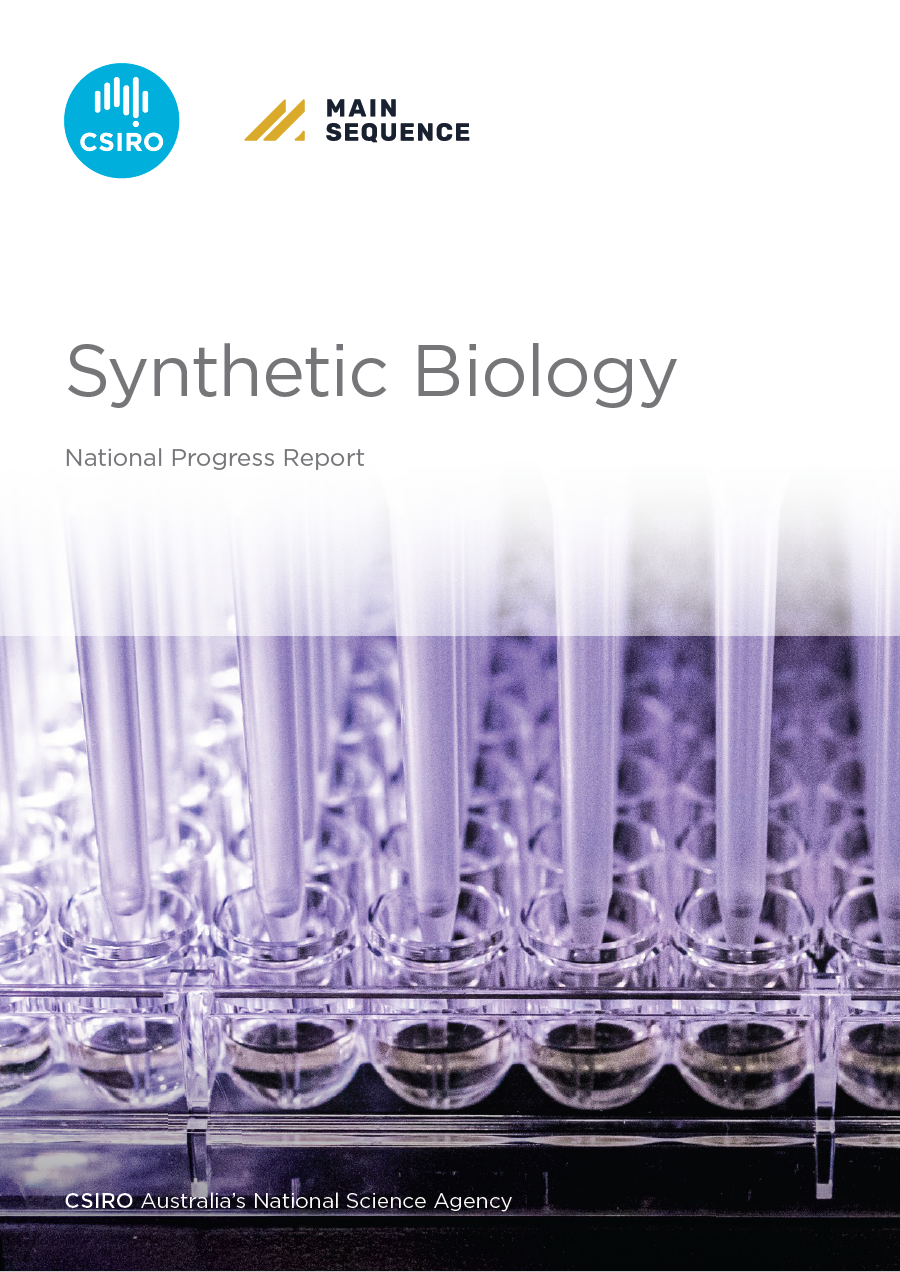Why synthetic biology?
 Synthetic biology is a transformative and interdisciplinary field of science. It applies engineering workflows and sophisticated genetic technologies to rapidly design and build novel biological solutions.
Synthetic biology is a transformative and interdisciplinary field of science. It applies engineering workflows and sophisticated genetic technologies to rapidly design and build novel biological solutions.
These solutions can underpin new products and manufacturing approaches across a range of industries, from novel medical products to the sustainable production of food, energy, medicines, chemicals, and materials.
They can also enable carbon emissions reduction and sequestration across these industries, accelerate the decarbonisation of the global economy, and create new jobs.
Download the reports
Positioning Australia for a $30 billion opportunity
A prominent domestic opportunity to develop a national synthetic biology capability exists. With appropriate support and investment, this capability could underpin up to $30 billion in annual revenue across impacted sectors and create over 50,000 new jobs by 2040.
The largest emerging markets for synthetic biology applications are expected to be food and agriculture, followed by health and medicine industries.
Developing Australia's national synthetic biology ecosystem could also help to:
- identify solutions to uniquely Australian agricultural and environmental challenges
- establish cost-effective domestic manufacturing capabilities to enhance supply chain resilience
- protect the nation from biological threats such as emerging infectious diseases or bioterrorism.
Capturing the full opportunity will require synthetic biology to be a critical national capability that underpins a thriving Australian bioeconomy. This will require maintaining investments in synthetic biology research while increasing support for the ecosystem's most critical challenge: industrial translation and scale-up.
The 2024 Progress Report
Since the release of the Roadmap in 2021, Australia has made several investments into further developing the nation's synthetic biology capabilities. This Progress Report highlights the evolution of Australia's synthetic biology ecosystem from 2021 to 2023, discussing major developments in research and industry, and updating the Roadmap's 2040 national market sizing analysis.
This report was authored by CSIRO Futures, with support from CSIRO’s Advanced Engineering Biology Futures Science Platform and Main Sequence Ventures.
Catch up on the Synthetic Biology in Australia webcast hosted by CSIRO Futures and Main Sequence Ventures to gain an in-depth understanding of the report's key findings.
The 2021 Roadmap
The National Synthetic Biology Roadmap report identified the value that synthetic biology could unlock for Australia and discusses how Australia can accelerate the demonstration, scaling, and commercial success of its applications.
The Roadmap sought to raise awareness of existing national capabilities, outline strategic growth opportunities, and provide recommendations for pursuing them. The Roadmap noted that synthetic biology would be critical to a thriving Australian bioeconomy, but greater national coordination was needed to support industrial translation, scaling, and the commercial success of its applications.
Why synthetic biology?
Synthetic biology is a transformative and interdisciplinary field of science. It applies engineering workflows and sophisticated genetic technologies to rapidly design and build novel biological solutions.
These solutions can underpin new products and manufacturing approaches across a range of industries, from novel medical products to the sustainable production of food, energy, medicines, chemicals, and materials.
They can also enable carbon emissions reduction and sequestration across these industries, accelerate the decarbonisation of the global economy, and create new jobs.
Download the reports
- A National Synthetic Biology Roadmap [2021] PDF (4 MB)
- Synthetic Biology National Progress Report [2024] PDF (1 MB)
Positioning Australia for a $30 billion opportunity
A prominent domestic opportunity to develop a national synthetic biology capability exists. With appropriate support and investment, this capability could underpin up to $30 billion in annual revenue across impacted sectors and create over 50,000 new jobs by 2040.
The largest emerging markets for synthetic biology applications are expected to be food and agriculture, followed by health and medicine industries.
Developing Australia's national synthetic biology ecosystem could also help to:
- identify solutions to uniquely Australian agricultural and environmental challenges
- establish cost-effective domestic manufacturing capabilities to enhance supply chain resilience
- protect the nation from biological threats such as emerging infectious diseases or bioterrorism.
Capturing the full opportunity will require synthetic biology to be a critical national capability that underpins a thriving Australian bioeconomy. This will require maintaining investments in synthetic biology research while increasing support for the ecosystem's most critical challenge: industrial translation and scale-up.
The 2024 Progress Report
Since the release of the Roadmap in 2021, Australia has made several investments into further developing the nation's synthetic biology capabilities. This Progress Report highlights the evolution of Australia's synthetic biology ecosystem from 2021 to 2023, discussing major developments in research and industry, and updating the Roadmap's 2040 national market sizing analysis.
This report was authored by CSIRO Futures, with support from CSIRO’s Advanced Engineering Biology Futures Science Platform and Main Sequence Ventures.
Catch up on the Synthetic Biology in Australia webcast hosted by CSIRO Futures and Main Sequence Ventures to gain an in-depth understanding of the report's key findings.
The 2021 Roadmap
The National Synthetic Biology Roadmap report identified the value that synthetic biology could unlock for Australia and discusses how Australia can accelerate the demonstration, scaling, and commercial success of its applications.
The Roadmap sought to raise awareness of existing national capabilities, outline strategic growth opportunities, and provide recommendations for pursuing them. The Roadmap noted that synthetic biology would be critical to a thriving Australian bioeconomy, but greater national coordination was needed to support industrial translation, scaling, and the commercial success of its applications.
